Results
-
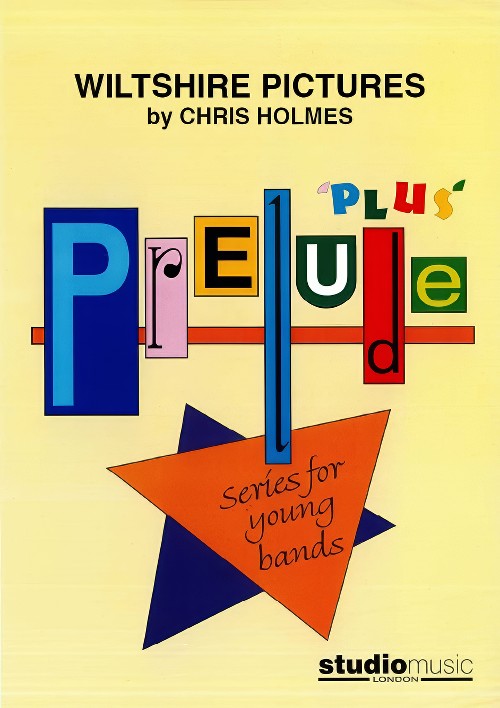 £59.95
£59.95Wiltshire Pictures (Concert Band - Score and Parts) - Holmes, Chris
Movement 1: Army on the Plain - More than 10% of Wiltshire is used by the Army for training, and all of it takes place on Salisbury Plain. As well as tanks and weapons of all sizes, there is plenty of marching!Movement 2: Spire - Since 1549 Salisbury Cathedral has had the tallest spire in the UK, at 123 metres. Majestic and awesome it soars over the elegant and peaceful Cathedral Close.Movement 3: Sarsen Stones - Stonehenge's vertical Sarsens weigh 20 tonnes and stand 7 metres tall, they are heavy!Movement 4: Moonrakers - From the 15th to the 18th century, there was much smuggling of illegal gin in Wiltshire. The story goes that a group that was trying to rake out barrels hidden in a village pond, and surprised by the Excisemen, feigned stupidity. They told the Excisemen they were trying to rake in the moon, reflected on the ponds surface. They were believed and left in peace! Wiltshire folk can still call themselves Moonrakers.Duration: 11:15
Estimated dispatch 7-14 working days
-
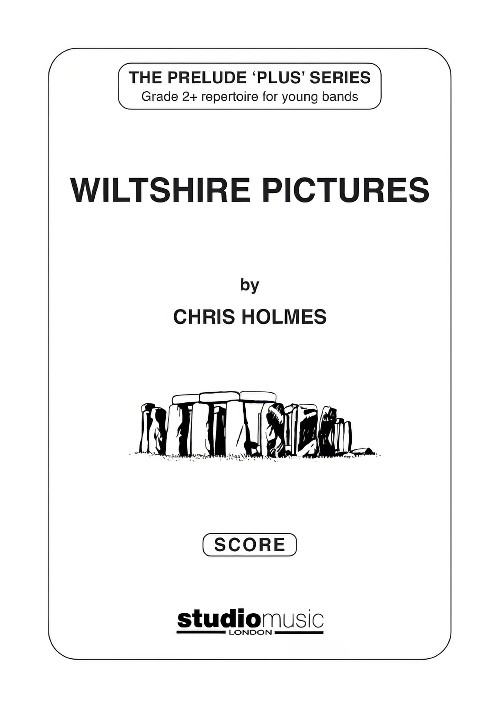 £11.95
£11.95Wiltshire Pictures (Concert Band - Score only) - Holmes, Chris
Movement 1: Army on the Plain - More than 10% of Wiltshire is used by the Army for training, and all of it takes place on Salisbury Plain. As well as tanks and weapons of all sizes, there is plenty of marching!Movement 2: Spire - Since 1549 Salisbury Cathedral has had the tallest spire in the UK, at 123 metres. Majestic and awesome it soars over the elegant and peaceful Cathedral Close.Movement 3: Sarsen Stones - Stonehenge's vertical Sarsens weigh 20 tonnes and stand 7 metres tall, they are heavy!Movement 4: Moonrakers - From the 15th to the 18th century, there was much smuggling of illegal gin in Wiltshire. The story goes that a group that was trying to rake out barrels hidden in a village pond, and surprised by the Excisemen, feigned stupidity. They told the Excisemen they were trying to rake in the moon, reflected on the ponds surface. They were believed and left in peace! Wiltshire folk can still call themselves Moonrakers.Duration: 11:15
Estimated dispatch 7-14 working days
-
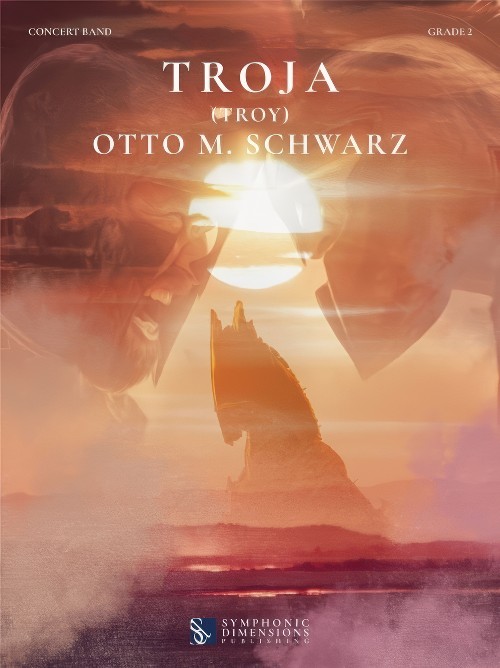 £79.99
£79.99Troja (Troy) (Concert Band - Score and Parts) - Schwarz, Otto M.
The Greek poet Homer wrote about Troy and the Trojan War, which probably took place in what is now Asia Minor, in his Iliad in the 8th century B.C. Nowadays, the term Trojan generally refers to a malware program that is used to gain unauthorised access to computers. This use comes from the legendary Trojan Horse, which saw the turning point in the battle between Greeks and Trojans through the cunning of Odysseus. Let us return to the beginning of the story: Paris, son of the king of Troy, is tasked by Zeus with judging the beauty of the three goddesses Aphrodite, Pallas Athena, and Hera. Aphrodite, the goddess of love, flatters Paris by promising him the most beautiful woman in the world. Soon afterwards, on a journey to Greece, Paris meets the beautiful Helen, who immediately falls in love with him. Since however she is the wife of Spartan king Menelaus, she eventually lets herself be kidnapped by Paris voluntarily. The Greeks then form a large army and go to war against Troy to retrieve Helen, leading to a ten-year siege of the city. The city is eventually conquered not through combat, however, but through Odysseus' cunning ploy. He has the idea of building an enormous wooden horse with warriors hidden inside. The horse is placed at the gates of the city. Thus, the Trojans are tricked into giving up the siege when, despite various warnings, they bring the horse into the city to dedicate it to the goddess Athena. At night, the soldiers climb out of the horse and open the gate for the Greek army. The troops storm the city and burn it to the ground. The royal family and all the Trojan warriors are killed, only Aeneas, the son of Aphrodite, escapes. Later, following many years' wanderings he and his acolytes will become known as the founders of the Roman people. There are various accounts of the fate of the beautiful Helen. She is said to have returned to Sparta with Menelaus and to have ruled there until the end of her life. Or maybe not...Duration: 6.00
Estimated dispatch 7-14 working days
-
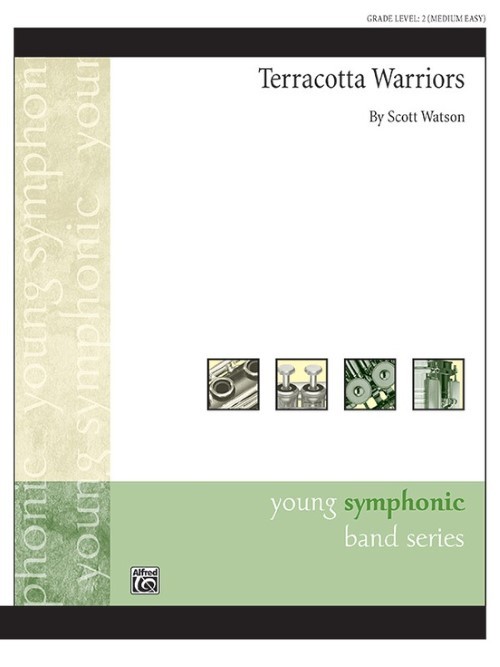 £62.95
£62.95Terracotta Warriors (Concert Band - Score and Parts) - Watson, Scott
This original work was inspired by the spirit army of 6,000 clay statues created in the third century B.C. for the tomb of the first emperor of China. A brief, plaintive folk chant summons the army from their centuries-old sleep. The warriors respond, with musical representations of uniform marching and weapons display. Duration: 4:30
Estimated dispatch 7-14 working days
-
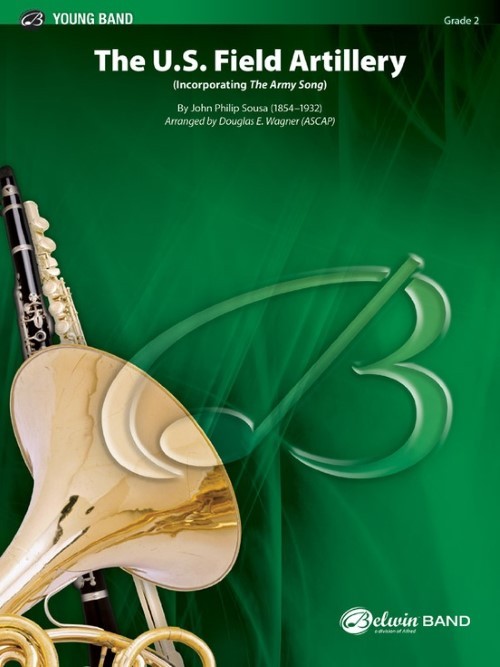 £60.50
£60.50The U.S. Field Artillery (Concert Band - Score and Parts) - Sousa, John Philip - Wagner, Douglas E.
Composed in 1917, "the official march of the United States Army" is one of Sousa's most frequently performed titles. It's unique in that it uses a familiar tune for the trio theme; in this case, "The Army Song." The original thematic material has been diligently preserved while scored to be accessible to the developing band.Duration: 2:30
Estimated dispatch 7-14 working days
-
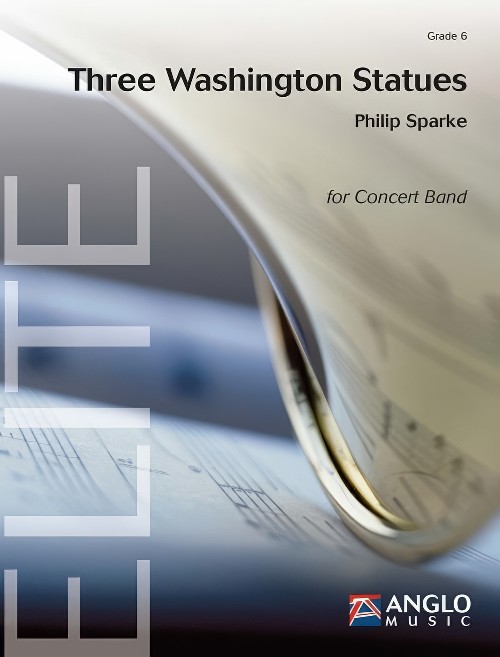 £164.99
£164.99Three Washington Statues (Concert Band - Score and Parts) - Sparke, Philip
Three Washington Statues was commissioned by the United States Army Band "Pershing's Own", led by Colonel Thomas H. Palmatier. Washington D.C. contains some of the world's most iconic monuments, memorials and statues. Philip Sparke has chosen three of these as the inspiration for this piece: 'The Lincoln Memorial' in the form of a Greek Doric temple in which the composer depicts the grandeur of this monument; 'The Martin Luther King, Jr. Memorial' on which steps the iconic speech 'I have a dream' was given - the music is both reverential as well as powerful referring to Martin Luther Kings' speech; and the 'Encore' statue in memory of the world famous African-American composer, pianist and bandleader Duke Ellington. In this final movement, Philip Sparke catches the virtuosic, energetic and unique dynamism of Ellington's' music. Three Washington Statues was commissioned by the United States Army Band "Pershing's Own", led by Colonel Thomas H. Palmatier. Washington D.C. contains some of the world's most iconic monuments, memorials and statues. Philip Sparke has chosen three of these as the inspiration for this piece: 'The Lincoln Memorial' in the form of a Greek Doric temple in which the composer depicts the grandeur of this monument; 'The Martin Luther King, Jr. Memorial' on which steps the iconic speech 'I have a dream' was given - the music is both reverential as well as powerful referring to Martin Luther Kings' speech; and the 'Encore' statue in memory of the world famous African-American composer, pianist and bandleader Duke Ellington. In this final movement, Philip Sparke catches the virtuosic, energetic and unique dynamism of Ellington's' music.Duration: 8:45
Estimated dispatch 7-14 working days
-
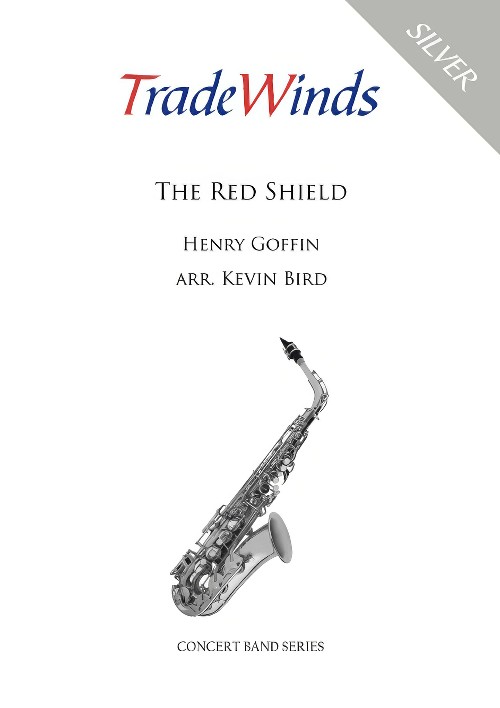 £54.95
£54.95The Red Shield (Concert Band - Score and Parts) - Goffin, Henry - Bird, Kevin
Written in 1928, this march has become a Salvation Army classic. The title refers to The Salvation Army red shield logo known the world over.
Estimated dispatch 7-14 working days
-
 £10.95
£10.95The Red Shield (Concert Band - Score Only) - Goffin, Henry - Bird, Kevin
Written in 1928, this march has become a Salvation Army classic. The title refers to The Salvation Army red shield logo known the world over.
Estimated dispatch 7-14 working days
-
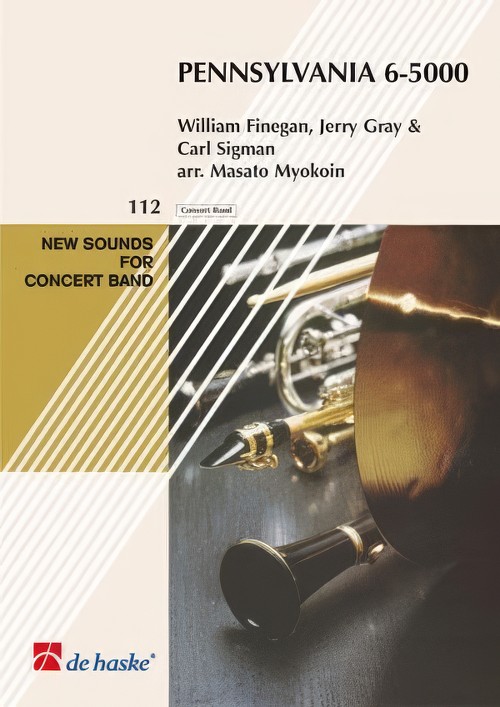 £104.99
£104.99Pennsylvania 6-5000 (Concert Band - Score and Parts) - Myokoin, Masato
In 1942 Glenn Miller voluntarily joined the army and founded the Glenn Miller Army Air Force Band and with his music he kept up the morale of the troops. In December 1944 he boarded an aircraft in England that would never reach its destination (France) - the plane was never found. The patriotic legend of this great composer however lives on in his music. Pennsylvania 6-5000 was one of the greatest successes of his famous band and is as popular today as it was in the 1940's.
Estimated dispatch 7-14 working days
-
 £84.95
£84.95Fire in the Blood (Concert Band - Score and Parts) - Lovatt-Cooper, Paul
Fire in the Blood was commissioned by Dr Stephen Cobb for the 120th anniversary of the International Staff Band of the Salvation Army. The piece was composed for the celebration concert where the ISB were joined by several other staff bands from around the world to perform independently to a sell-out capacity crowd at Britain's most famous concert hall The Royal Albert Hall. Fire in the Blood received its world premier at the 'ISB 120' concert at the Royal Albert Hall on June 4th 2011.With this piece I wanted to acknowledge music that had an impact on me through my Salvation Army upbringing. When thinking of a title for this piece I had no hesitation than to reflect and re-word the Salvation Army's motto under their famous crest 'Blood and Fire'.When composing Fire in the Blood I wanted to use three songs of worship that have been prevalent in the Salvation Army's services over a number of years. Opening with Richard Phillips' setting of Psalm 95, 'Sing for Joy', the music is vibrant and full of energy, I wanted to capture the spirit of the well known words of Scripture. The music then moves into a more reflective section that includes Howard Davies' emotive song melody 'Lord, you know that we love you' and Laurie Klein's worship song 'I love you Lord'.A re-statement of the opening Psalm setting follows and this, in turn, leads into a dramatic and powerful finale that combines two pivotal statements drawn from the slower, reflective section: I love you lord, and I lift my voice to worship you, O my soul rejoice and Lord, you know that we love you with a final flourish from Psalm 95: Come let us sing joy to the Lord!- Paul Lovatt-CooperDuration: 10:00
Estimated dispatch 7-14 working days
